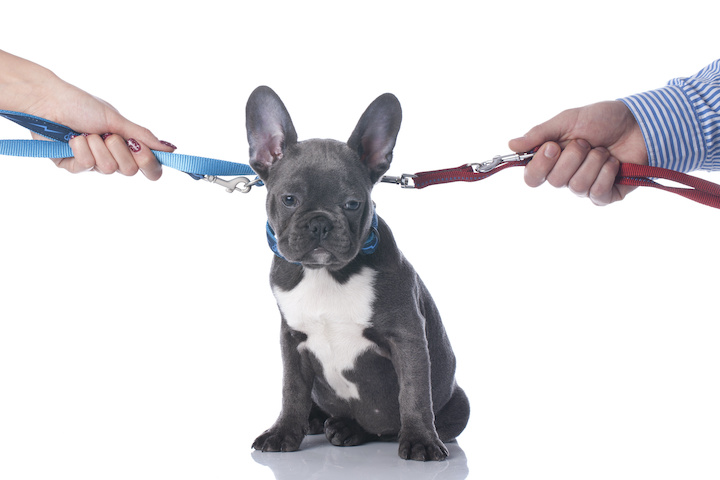Dogs and cats are beloved members of the family but in almost all states, they are considered property, just like a couch. Of course most of us consider them a member of the family so how do you decide who gets the pet or how to share custody? Asking to keep a pet just to “spite” your ex might land you court and litigating cost lots of money. Some judges sympathize with how the parties feel about their pet but other judges feel that it a completely waste of their time. Settle this matter out of court.
Consider the long term implication of sharing custody if you would otherwise not be seeing your ex. It can make it hard to move on. For instance, if your ex asks you to babysit over the weekend, will the fact that your ex may be going away with a new love interest cause you great angst? The emotional cost of regularly having contact with your ex may be more than the cost of leaving a pet behind. This is something for you both to talk and think about, even if you are divorcing amicably.
On the other hand, if you have kids, considered having the pet follow the same custody schedule as the kids. Having the pet to snuggle with for emotional support can help kids get through a tough time. However, that will call for additional logistics since often, custody is exchanged by dropping off and picking up kids at school. If this is the case, you may consider whether it might be better to leave the pet with the parent that has the most custody time.
What is in the best interests of the pet? Who has a better schedule to tend to the pets potty schedule and exercise needs? Is the pet attached to one spouse in particular? Who has historically tended to feeding, grooming, veterinary care, and training? If it’s one spouse in particular, it may be fair for the person who has put in the most “sweat equity” should get custody of the pet.
If there is shared custody, who will pay for veterinary care? Spouses might have differing ideas on what is proper veterinary care. For instance one might think regular teeth cleaning is standard while the other might think that’s over the top. In this case, the person willing to pay for veterinary care might have more leverage as far as custody. In shared custody situations, on top of visitation schedules, this cost must be addressed. Even if the pet is kept at just one residence, if the pet is for the benefit of the children, in fairness the costs related to the pet should be considered in the budget for purposes of child support or spousal support.
Is your pet pretty flexible when it comes to a change in surroundings or does that cause major stress and anxiety? If your pet is one that won’t do well in a move, consider what is best for the pet and leave the pet in its present home. Older pets also are not as flexible and leaving the pet at one home may work best. Cats tend to not be flexible about changing homes.
Was the pet obtained prior to marriage by one spouse? In North Carolina, pets are considered property and like anything else, property obtained prior to marriage is considered separate property. However, if the couple was living together when the pet was obtained, that could muddy the water as to who obtained the pet. Regardless, a pet is not like a couch and considering the pet’s best interests should supersede.
f there are two or more pets, consider splitting the pets. This might not work and isn’t fair to the pets if they are very attached to each other. In other cases, pets are happier when they are the only child. If the pet cost a substantial amount of money, as some designer breeds do, consider exchanging the pet for an amount of money equal to the cost of a new puppy or kitten. Similarly, if the pet has not been spayed or neutered, consider breeding the pet and giving the non-custody spouse first dibs (for free) on the puppies or kittens.
Whatever is decided, put the needs of the pet ahead of your own needs. Remember that divorce is emotionally hard on your pet as well.

